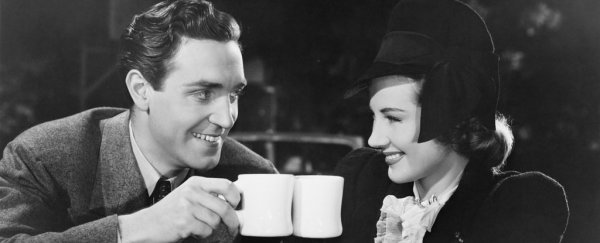There's no shortage of scientific research highlighting the risks of consuming too much alcohol, but a new study suggests at least some good can come from enjoying a drink… or going teetotal, for that matter.
Researchers in the US have found that older couples enjoy happier relationships when they have the same kind of drinking habits as each other.
"We are really excited about the findings because they show that the effects of drinking truly depend on the context of the couple," researcher Kira Birditt from the University of Michigan told Abigail Williams at The Huffington Post.
In other words, when it comes to getting on well with your partner, whether you drink could actually make you feel happier in your relationship, provided you're both partaking, that is. Abstaining also works – again, as long as you're both doing it.
But if there's a mismatch in your drinking habits – ie. one person drinks and the other doesn't – the researchers suggest it becomes more likely that there'll be a negative impact on relationship quality.
"The study shows that it's not about how much they're drinking," Birditt told Linda Thrasybule at Reuters, "it's about whether they drink at all."
In the study, Birditt and fellow researchers examined data from 4,864 married participants who took part in the Health and Retirement Study, a longitudinal survey looking at the health and well-being of adults aged 50 and older in the US.
The participants were interviewed and answered questionnaires on their drinking habits, including whether they drank, how much, and how often – in addition to answering questions on the quality of their relationship, what they thought about their spouse, and how they got on with one another.
The findings, reported in The Journals of Gerontology: Series B, showed that concordant drinking couples – pairs who either both drank, or both abstained – reported better relationship quality over time.
"We're not sure why this is happening," Birditt told Reuters, "but it could be that couples that do more leisure time activities together have better marital quality."
The study revealed that, among the group surveyed, in more than half of the couples both the man and the woman drank alcohol, and husbands were more likely to drink than their wives.
Interestingly, when it came to reporting negative relationship quality, the wives showed more dissatisfaction with their marriages if their husbands didn't drink than the other way around.
But while the research could be taken to suggest that couples that drink together stay together, the researchers are eager to clarify that their findings should not to be taken out of context.
"We're not suggesting that people should drink more or change the way they drink," says Birditt.
And it's important to remember that serious alcohol abuse can have terrible effects on relationships – something that the researchers weren't primarily focusing on in this particular study.
"Problem drinkers are a whole different kettle of fish," psychiatrist Fred Blow – also from the University of Michigan but not involved with the study – told Reuters.
"Serious heavy drinkers have disruptive relationships with people, particularly their partners. That's an important issue that should be looked at going forward."
The same message is endorsed by organisations advocating for the responsible use of alcohol, who are keen to point out that the way we drink can have devastating effects on our relationships – regardless of whether we're drinking in sync with our partners or not.
"Alcohol can also have a negative effect on relationships if not drunk in moderation," Elaine Hindal, CEO of British alcohol education charity Drinkaware told media in comment on the research.
"Alcohol works on the brain to lower our inhibitions, which can lead you to say something in an argument which you may come to regret."
